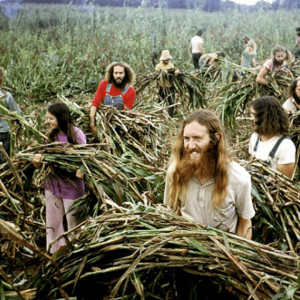Collaborative Provisioning
participatory governance of 'common purse' communal unions

Defining the Building Blocks of 'Common Purse' Provisioning
For the communal unions to succeed in demonstrating the path and processes that establish support networks able to sustainably share all with all, every participant must dedicate time and energy to becoming financially literate.
In practical terms, this means that from the fifth year of association and beyond, every communitarian seeks to understand and achieve a high level of competency in creating and sustaining economic provision of all that sustains life, liberty and security.
This includes, however is not limited to becoming competent in devising projections of needs which includes food, clothing, accommodation, transport, child-care, education, medical and dental care, along with recreation and travel.
Defining 'Common Purse'
A common purse economy refers to the pooling of funds and resources that are shared by a group, for member and group purposes. While the practice has ancient roots encompassing many diverse cultures and time periods, this form of collaborative economic production and distribution according to need, in modern times, is most commonly installed by communes as well as Christian and ecological-based intentional communities based on the tenet of ‘holding all things in common’.
Every communitarian becomes economically secure by association, not by social standing, profession or position, nor age or gender. Through the Common Purse economic arrangement, no communitarian is any richer or poorer than any other.
Following a period of probationary association in which communitarian’s prove their qualifications to be received into union, all of his or her earnings are pooled with everyone else’s into a common purse. From these communal funds, each receives necessities such as food, clothing, accommodation, transportation, education, medical and dental care as well as funds for recreation and travel.
Within communitarian circles, community of goods coupled to a ‘common purse’ are the practical expressions of commitment to evolved social, economic and ecological ethics. Adhering to the tenet of ‘One Cloak’ in our daily lives, communitarian seek to live frugally by avoiding excess and waste. Our aim is to contribute generously to both our immediate communal unions as well as support the establishment of regional and wider-world unions that provide peaceful, secure, sustainable shared ‘common wealth’ human habitat.
The option to either take from or add to the common purse stands before each communitarian living in union, each and every moment of our life. Adding to the common purse means conserving resources, seeking ways to share instead of holding items for exclusive use. Those living by the principle and practice of ‘holding all things in common’ aim to pour out all that we are and all that we have, to be extravagant, unreasonable, even wasteful in loving the common purse lifestyle that is born of liberated love – love-in-action. When we adopt that mindset, we contribute to the betterment of the entire world.
Definition of Provision
Definition of Provision – arrangement or preparation beforehand, as for the doing of something, the meeting of needs, the supplying of means, etc. something provided; a measure or other means for meeting a need.
Noun
- The action of providing or supplying something for use
- Similar: supplying, providing, delivery, furnishing, equipping, giving, donation, allocation & distribution
- An amount or thing supplied or provided
- Similar: facilities, services, amenities, resources, equipment, arrangements, solutions, means, offering, funds, benefits, assistance, allowance, concession & opportunities
- A condition or requirement in a legal document
- Similar: term, clause, requirement, specification, stipulation, proviso, condition, qualification, restriction, reservation, caveat & limitation
Verb
- Supply with food, drink, or equipment
- Similar: supplies, food and drink, stores, stocks, groceries, daily bread, staples & sustenance
- Set aside an amount in an organization’s accounts for a known liability
Definition of Economy
ECONOMY is the structure or conditions of economic life in a country, area, or period; also, the term refers to an economic system.
The main factors that determine the structure and function of an economic system is set by multiple factors which include culture, values, education, technological evolution, history, social organization, political structure, legal systems and natural resources.
Noun
- The state of a country or region in terms of the production and consumption of goods and services and the supply of money
- Similar: wealth, financial resources, financial system, financial state & financial management
- Careful management of available resources
- Similar: thrift, providence, prudence, thriftiness, carefulness, good management, careful budgeting, economizing, saving, restraint & frugality
'Common Purse' Provisioning Committees
Those involved in the Provisioning Committees act as stewards to establish secure provision for the welfare of every person living within the communal union. Appointed stewards work in close collaboration with the whole of the unions as well as work in partnership with adepts who are experienced in developing and managing sustainable industries as well as financial accounting and participatory planning.
Participatory Planning
Collaborative provision planning requires input from everyone in the unions. An allocation system that complements the various production and distribution practices, requires formulation as well as regular adjustment as needs and production opportunities evolve and change.
It is important for those intending to be received into union to bear in mind that collaborative provisioning cannot be based on, nor mimic competitive markets or command planning since these economic systems cannot achieve the social, economic or ecological principles and practices of communitarian values or missions.
For these reasons, allocation of both labor and resources within the context of ‘common purpose’ production and distribution is accomplished via a series of ‘Participatory Planning’ sessions. This form of economic planning requires the entire union’s participation in a series of ‘rounds’ designed to ‘script’ the scope of the unions’ provisioning activities to arrive at an efficiently feasible financial plan that has the capacity to sustain and expand the prosperity of the communitarian collectives.
The broader scoped, ‘Participatory’ provisioning committee planning sessions are annual events carried out at three levels – local, regional and global. The objective of all levels of annual provisioning planning sessions is to bring to fruition, economic planning and projections geared toward longer-term investments and development plans agreed upon by successive provisioning committee planning sessions.
Fundamentally, the aim of the provisioning planning sessions is to accurately determine and calculate the supply of labor and expertise, along with capital equipment and instruments available for use within the planning period that encompasses projections ranging from 1-40 years.
Communitarian Union Legal Structure
Distinct legal entities with appropriate civil-law governance are commonly established to further the purposes of communal union support structures. As an example, a formal incorporation maybe set up to hold title or lease agreement on an accommodation or production property.
Should any such entity ever be dissolved, no member would receive anything at all. Instead, any assets or funds remaining would be ‘contributed’ to communitarian networks following the rule of supporting ‘local’ first, ‘regional’ second and wider-world unions, third.
Under this structure, no one can gain from orchestrating the demise of ‘common purse’ accumulations of assets or funds. The statutes of all legal bodies associated with communitarian unions everywhere in the world, reflect this understanding.








